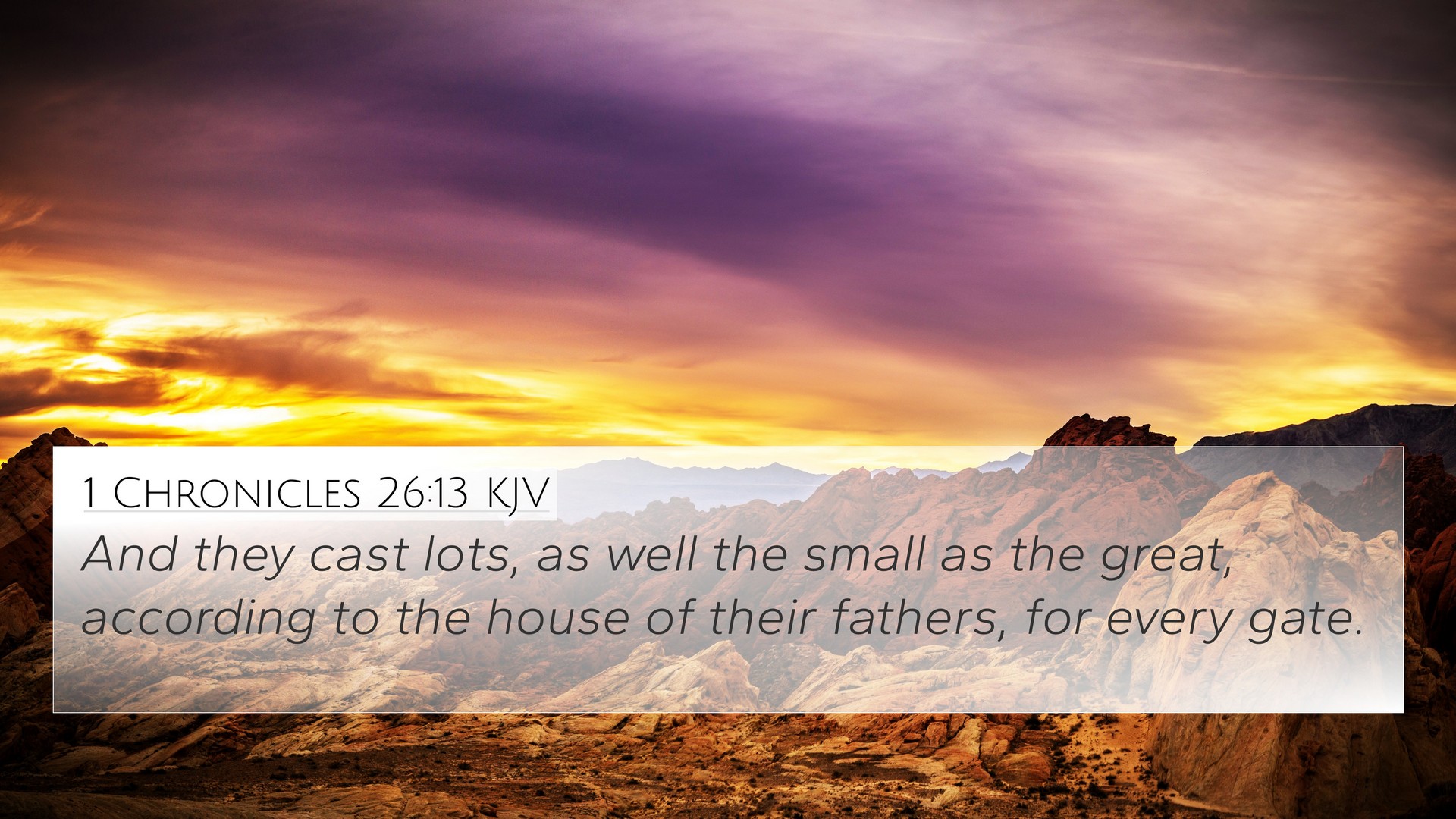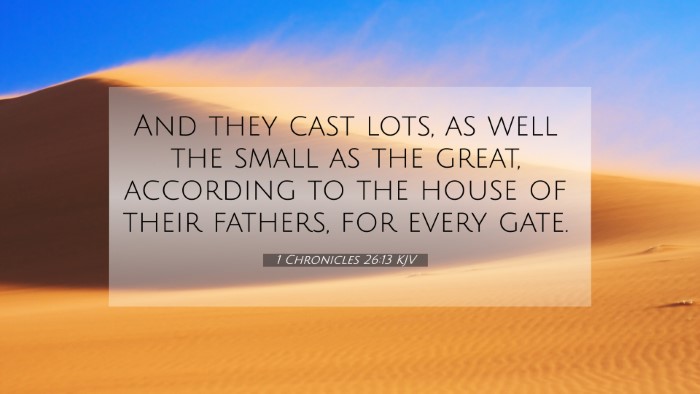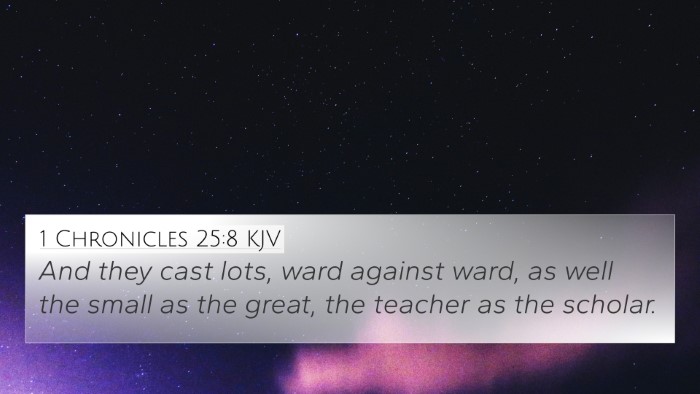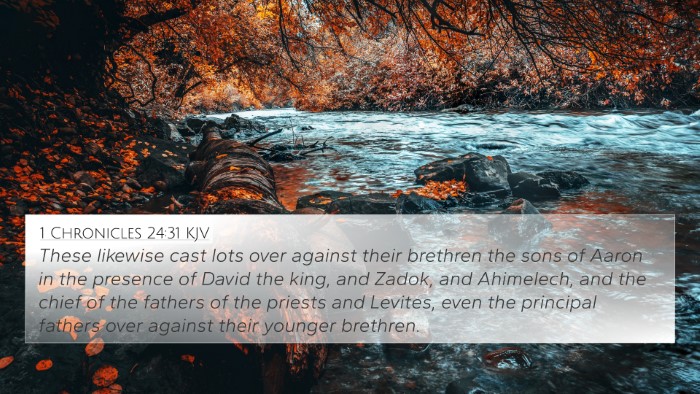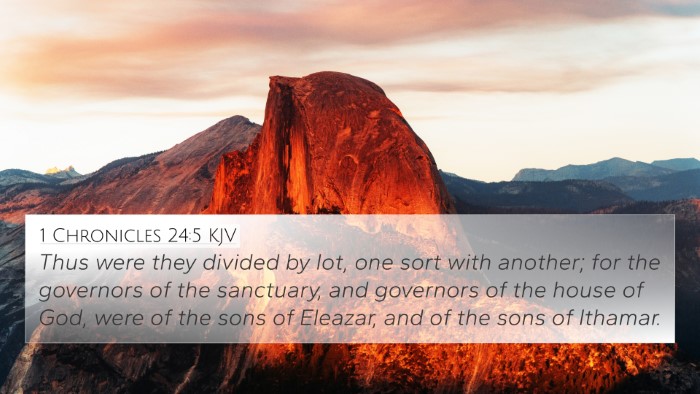Understanding 1 Chronicles 26:13
The scripture in 1 Chronicles 26:13 serves to highlight the organization and duties assigned to the gatekeepers of the temple, illustrating the importance of order and responsibility in worship. The verse states:
"And they cast lots, as well, the small as the great, according to the house of their fathers, for every gate."
Summary of 1 Chronicles 26:13
This verse indicates a process of assigning roles among the gatekeepers through casting lots. This method not only ensures fairness but also divine guidance in the selection process. Such practices remind us of the ancient Israelite structure of worship, where order was vital for community coherence and the proper functioning of religious duties.
Insights from Commentaries
-
Matthew Henry:
Henry emphasizes the significance of casting lots as a means of divine selection, which alleviates favoritism. It reflects the acknowledgment that God is in control over the assignments of individuals, even in seemingly mundane tasks.
-
Albert Barnes:
Barnes points out that this system of organization for the gatekeepers underlines the importance of their roles in maintaining the temple’s sanctity. He notes that whether large or small, every individual had a part to play, suggesting a unified approach to service among the worshippers.
-
Adam Clarke:
Clarke highlights the communal aspect of casting lots, where decisions were made collectively, avoiding any potential disputes that might arise from subjective appointments. This reflects a broader biblical principle of shared responsibility amongst God's people.
Bible Cross-References
To further understand the themes of organization, divine guidance, and community involvement in worship as exemplified in 1 Chronicles 26:13, consider the following cross-references:
- 1 Chronicles 24:5 - Discusses the division of duties among the priests by casting lots.
- Acts 1:26 - The apostles also cast lots to decide on a successor to Judas Iscariot, showing consistency in seeking divine direction.
- Proverbs 16:33 - Highlights that lots are cast, but their outcome is determined by the Lord, reinforcing the sovereignty of God in decision-making.
- Numbers 26:55 - A reference to how the land was divided among the Israelites, emphasizing the directive of divine distribution.
- Matthew 18:19 - Reflects on the power of collective agreement within a community of believers, akin to casting lots.
- Exodus 28:30 - The use of the Urim and Thummim by the high priest for discerning God’s will, a spiritual parallel to casting lots.
- Nehemiah 11:1 - Discusses the allocation of inhabitants to Jerusalem, again considering the role of divine oversight in placement.
- 1 Corinthians 14:40 - Paul emphasizes the importance of order in worship, which resonates with the structure implied in our verse.
- Philippians 4:2-3 - Paul’s entreaty for unity among believers correlates with shared roles as discussed in 1 Chronicles.
- Luke 1:10 - The multitude of people praying illustrates community involvement in divine processes, akin to the decision-making methods in the Old Testament.
Connecting Themes in Scripture
The practice of assigning roles through decision-making processes like casting lots emphasizes significant themes recurrent in the Bible:
- Divine Order: Throughout scriptures, God's order is paramount, as seen in both the Old and New Testament.
- Community Responsibility: Each member of the community plays a role, from temple gatekeepers to apostles, establishing a culture of shared responsibility.
- Spiritual Oversight: Whether it is through lots or leadership roles, God remains the ultimate authority guiding the affairs of His people.
- Equity in Service: The methodology displayed ensures fairness, reminding believers that each service, whether great or small, is significant in God’s plan.
How to Use Bible Cross-References
To study scripture effectively, utilizing a bible concordance or a bible cross-reference guide can aid in identifying connections. Here are some tools and methods to enhance your study:
- Identifying Themes: Start by noting themes in your primary verse and cross-reference with related verses from a bible cross-reference system.
- Using a Bible Concordance: A concordance lists words and phrases, allowing for deeper exploration into similar themes and concepts.
- Comprehensive Analysis: Engage in comparative bible verse analysis to draw parallels and contrasts between related passages.
- Linking Scriptures: Track connections between verses that relate to each other to see the overarching biblical narrative.
Conclusion
1 Chronicles 26:13 illustrates the significance of divine order, equitable service, and the community's responsibility in worship. By engaging with cross-references, believers can deepen their understanding of biblical themes and enhance their study through structured approaches in cross-referencing Bible study methods. These insights encourage an appreciation for organized worship and serve to connect the scattered elements of biblical teachings into a cohesive narrative.
